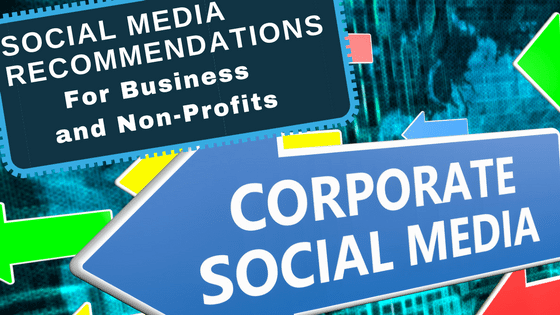I keep running into businesses that do not have or need a social media/digital asset policy for their company and their office. I have been tasked by a new client to review the policies sent forth from the c-level and write a “social media policies for business” and then come in and present it to the employees. And I thought what a great idea for a blog post and later video.
Now the people who asked me to do this are a church, but as I stopped to think about this, there are so many different groups that need social media policies. And, management of these organizations needs to understand these policies, written by lawyers.
But what should social media policies for business and non-profits cover?
#1 Social Media Property Ownership | Domain Ownership
We often run into situations where the business or the principle of the business does not own their own digital assets. From Domains and web hosting accounts to Facebook accounts this is an ongoing problem.
Without exception, the company domain name, the company Facebook, Twitter accounts, the administrative access into the website all need to be held correctly. There seem to be more issues in the non-profit world, ie little league, scout troops and apartment complexes but we see this a lot with web designers and former employees
- Domain Registrant should be owned by the company or organization and should never we owned by an individual. Use a centralized email box that can be easily accessed and everyone has the password to. office@yourbuisiness.com domains@yourbusiness.com
- Social properties should be tied to a principle of the company. Or if an organization, create a faux personal account that uses the domains centralized mailbox and then tie the Facebook or LinkedIn profile to it.
- Employees and volunteers alike should not be allowed to have exclusive control over assets.
- Watch allowing vendors administrative access. Make sure you know what they have changed and that you can revoke privileges at any time.
- Make sure that all employees and staff members are aware that once something is written for the company it becomes the property of the company exclusively and they do not retain the rights to use or reuse the material.
#2 Photos
 This is another area we see a lot of issues within organizations. There are multitudes of licensing agreements, even when buying an image from places like Shutterstock or Istock photo. I feel like I have a very overly simplified solution. Buy an iPhone 7. The picture quality of that phone is so great it will allow you to take stock photo quality pictures that are license worry free. This picture of the Williams Tower in Houston was taken by me with my iPhone. But in case you can’t find the perfect shot for your social media post or website, let’s look @ licensing agreements and copyright issues.
This is another area we see a lot of issues within organizations. There are multitudes of licensing agreements, even when buying an image from places like Shutterstock or Istock photo. I feel like I have a very overly simplified solution. Buy an iPhone 7. The picture quality of that phone is so great it will allow you to take stock photo quality pictures that are license worry free. This picture of the Williams Tower in Houston was taken by me with my iPhone. But in case you can’t find the perfect shot for your social media post or website, let’s look @ licensing agreements and copyright issues.
- You cannot cut and paste from Google images. These images are not for free or fair use which is a popular misconception. Also, altering them does not make them yours. Another misconception. So you cannot download a minion, put a meme on it and then post it to your commercial Facebook page or commercial website.
- Royalty Free Licensing does not mean the image is free to use. What it means is the image has a negotiated fee and then you have the freedom to use the photo. But you are not allowing to distribute that photo. This does not mean you can use the photo and not have to pay for it.
- Creative Commons licenses have been around since 2001. It was designed as a way legally share material that someone wants to do for free. CC licenses have do not have a lot of court cases on file so it is a little unproven in the United States. The issue I see is the possibility of still having issues for business or commercial use. There is a series of steps that must be carried out for the license to be valid. If you are a large corporation, chances are you will get it right. If you’re a mom and pop shop, you may or may not get it right. There is an ever-growing list CC court cases.
- Understand the Commercial use clauses when you buy photography from places such as Istock Photo. Getty Images, the now owner of Istock, have quite vigorously perused images that they say were not legally obtained or used within the confines of their licenses agreement.
So, what is the answer, I don’t think using your own photos is that far out of the mainstream. But I would recommend approaching images for web and social with great care. I often recommend canva.com as a great work around to all of this image issues, other than if you start importing your own and then all bets are off. I want to remind everyone that I am not a lawyer, I am a web hosting company, web designer, and social media blogger. I use my dog, who is cute, I run around Houston taking my own pictures and I try to avoid any type of images that I can’t call my own. It’s up to you to figure out how much of a risk you are willing to take.
But let me share a true story. As a web host, we get Copyright complaints. So, one come through saying that one of our clients were using an image of the City of Houston. When you go to the page, it’s ranked very high in the Google image search for Houston. When you go to the site, it looks like a little amateur photography. Well, it’s a trap. The guy hunts the people down and demands several hundred dollars or threatens the people to take them to court. It’s very entrepreneurial, but for the little league who used the picture, it was not so happy a time.
#3 Employee Conduct
So, did you know that your Facebook profile holds a treasure trove of who you are? Employers may use your social media profiles to find out about who you are and may use that information in hiring decisions. 44% of employers find alcohol posts worry some according to Money Magazine. I personally was featured Fox to talk about what you can learn from someone likes. It is advisable for all employers to have a policy on Social Media conduct. If your employees have friends that are business associates, then you need to be sure they understand that they are on the clock with every post they make. Posts about politics, religious belief have the potential to turn potential clients off. And for business owners, your responsibility is even higher, because what you post on social media will be how clients judge your business.
Everything from the TV shows you watch, to the music you like send personal pieces of information that may allow clients to judge you, your employees or your business. Your employees also reflect your values, so if they conduct themselves inappropriately, that reflects on you. The best policy is that employees not befriend clients. And employee accounts should not be used to manage your social media profiles. The last thing you want is a drunk friend showing up on your business Facebook page.
There are multiple lists of negative social media behavior that may disqualify someone from being hired, but these are good rules to be written into an employee handbook in some way.
- Inappropriate or provocative photos, videos or information.
- Pictures of drug and alcohol use either by the employee or condoning the activities
- Discriminatory comments on race religion gender, sexuality
- Foul language posts
- Bad mouthing their present or previous employer or coworkers
- Sharing inappropriate or polarizing opinion pieces or memes
- Over posting of duck faced selfies
Other Odds and Ends
There are a few other odds and ends that should be included in a social media
- If you post photos or video be sure to protect people’s privacy. Don’t randomly tag people who may not want to be identified.
- Don’t tag minors even if you have a media release
- Put policies in place that prohibit the posting of workplace videos without permission of management
- If a non-profit working with children avoid using the chat or messaging feature with minors
- Make sure you have multiple admins
- Have an Enforcement policy that will allow you to take appropriate action that is written and signed into an employee handbook.
There are many ins and outs and I will be creating some additional materials to support this blog post in the next week. Be on the lookout for how this can help your business or nonprofit.
- Vertical Web Wins Triple First-Place Honors in “Best of West Houston 2025” Awards - December 4, 2025
- AI That Helps, Not Hurts: How to Use ChatGPT, Claude & Gemini for Real-World SEO, Content & Local Visibility - October 31, 2025
- Happening Today: Social Media and Brand Building in an AI Age. Join us! Register. - October 22, 2025

